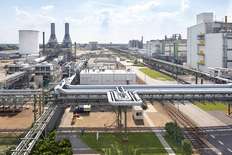- The Schwarzheide plant will produce cathode active materials for 400,000 EVs annually.
- The plant in Schwarzheide will use precursors from BASF's Harjavalta, Finland plant.
- Startup of the two plants is planned for 2022.
- The Harjavalta plant will utilize renewable energy resources, including hydro, wind, and biomass-based power.

New Production Site in Germany
BASF is establishing a new battery materials production site in Schwarzheide, Germany, as part of its investment plan to bolster the European EV value chain. The plant will produce cathode active materials (CAM) with an initial capacity to supply around 400,000 full electric vehicles annually.
Modular Design and Rapid Scale-Up
The Schwarzheide plant’s modular design allows for quick scaling of manufacturing capacities to meet growing demand in the European EV market. The plant will use precursors (PCAM) from BASF’s Harjavalta, Finland plant, with both sites scheduled to start operations in 2022.
Local Production Capacities
These investments will make BASF the first CAM supplier with local production capacities in Asia, the U.S., and Europe. The company aims to provide a reliable, sustainable, and European-based supply chain, including base metal supply, precursor production, and cathode material production within one region.
Energy Efficiency and Sustainability
The Schwarzheide site will use an energy-efficient gas and steam turbine power plant, currently being modernized to enhance eco-efficiency. Plans include integrating renewable energies before the battery materials plant is commissioned. The Harjavalta plant will utilize renewable energy sources like hydro, wind, and biomass-based power, ensuring a low CO2 footprint for CAM materials.
Support for European Battery Production
These investments align with the European Commission’s agenda for a European battery production value chain and are part of the “Important Project of Common European Interest (IPCEI)” approved by the European Commission in December 2019 under EU state aid rules.

